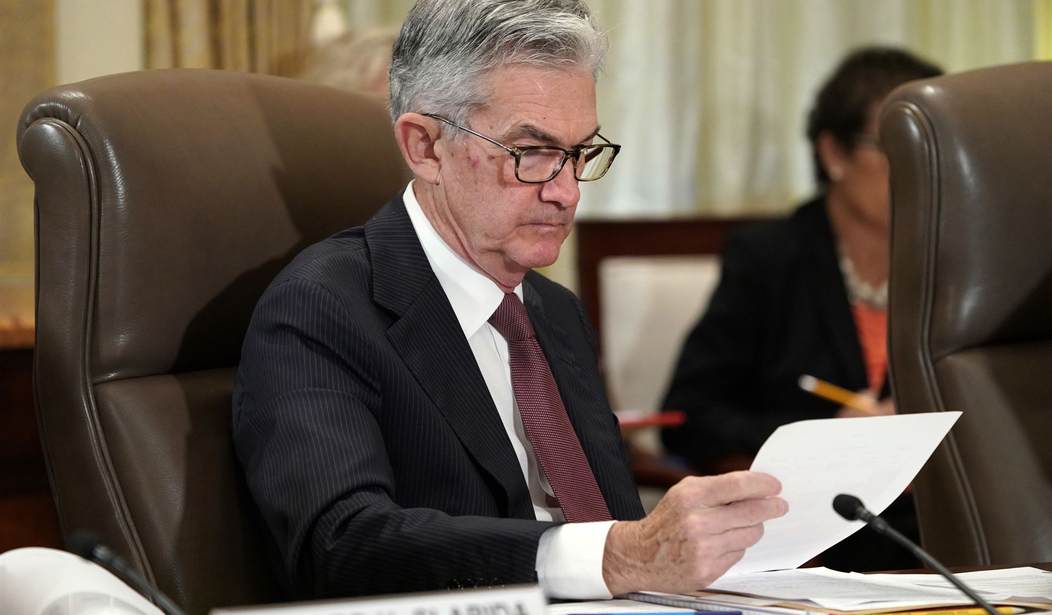If there is any lesson we have learned about the Federal Reserve system in the last few years, it is that the supposed oracles who run our central bank are anything but infallible.
This time last year, Federal Reserve Board Chairman Jerome Powell made a multitrillion-dollar mistake by raising interest rates at a time of no inflation and even some signs of deflation. The result was a 2,000-point fall in the Dow Jones, an economy that nearly plunged into a Fed-triggered recession and the worst Christmas in years.
The Fed was also asleep at the switch in preventing the banking system collapse in 2008, and a case can be made that the Fed's easy money policy lit the match that created the forest fire we now refer to as the Great Recession.
Now the Fed is busy expanding its mission. In August, the bank announced that it would launch a real-time payment system, FedNow Service so that financial transactions throughout the banking system can get cleared and settled nearly instantaneously.
The problem here is real. America has fallen behind in this clearing of tens of billions of financial transactions. When a customer in most developed nations wants to make a payment through the banking system, the transaction is processed nearly immediately. In America, a transaction can take one or more business days to clear. These delays cost families and businesses an estimated $3.5 billion a year through slowing the conclusion of timely deals, missed payments and overdrawn accounts.
But the need for government intervention is highly questionable. The Fed spent almost a decade "studying" this problem, and it wasn't until after a network of 25 banks had already received the Fed's blessing to invest a billion dollars into creating a real-time payment, or RTP, service that the Fed took action itself.
Recommended
The private bank network launched in 2017 and already connects roughly 60% of the nation's checking and savings accounts. It was expected to expand to more than 90% within a year or so, but progress has been stalled because of the Fed's actions.
Meanwhile, the whirlwind revolution in cryptocurrencies will use the blockchain to bring real-time payments into the 21st century -- thus soon rendering FedNow entirely duplicative.
The Wall Street Journal has likened FedNow to a "public option" -- the left's favorite term these days. But so far, the Fed is leveraging its manifold public advantages -- such as its direct access to unlimited capital from the monetary system it oversees -- to steamroll private bank competitors.
This is particularly unfair because the Fed had previously declared that "ultimately, implementation of (real-time) proposals will be driven by the private sector."
So, what's the problem? First, we now have a Fed that regulates the banks, providing them with services -- never a good idea. Second, the Fed is refusing to commit that its FedNow service will be interoperable and compatible with any private sector competitors -- which is a move that can only be interpreted as a monopolistic strategy to squash competitors.
Third, the Fed is refusing to commit that this service will be a level playing field -- and not favor the big banks with bulk volume discounts in its pricing. The Fed has a long and inglorious history of engaging in such discriminatory pricing -- to this day, favoring the big banks in check-clearing services while operating the Automated Clearing House's check-clearing services. Should the Fed's system launch without being interoperable, and without operating under a flat pricing model, this would only impede the goal of ensuring that all Americans will be able to have their payments clear in real-time.
Ironically, when Fed board Gov. Lael Brainard made the announcement of the Fed's real-time payment system, she justified the intervention by declaring, "Everyone deserves the same ability to make and receive payments immediately and securely, and every bank deserves the same opportunity to offer that service to its community." That principle lasted about six months.
At this stage, there is probably no way to put the toothpaste back in the tube, meaning that FedNow is with us for good. But its role should be shaved back to supplement the real-time market, not collapse it into a Postal Service-type monopoly. Congress and/or the Fed should now intervene to force it to first make the system operable with the private system, so any bank can use it. Second, it should not be allowed to discriminate in price against small, community banks, which have already been shrinking thanks to regulations such as the Dodd-Frank Act.
FedNow is only the latest worrisome sign that the feds want to move in a predatory direction when it comes to the banking industry. Sen. Elizabeth Warren is calling for more government competition against private financial institutions, advocating that the post office offers retail banking accounts. Other progressives have proposed the Fed leverage its gigantic size and unlimited access to capital to directly compete with private banks for basic retail services, such as check cashing or even low-interest lending.
The idea sounds so benign: a "public option" to lower costs to consumers. But beware: As we've learned in so many other industries -- such as health insurance -- these "public options" almost inevitably morph into the only option.

























Join the conversation as a VIP Member